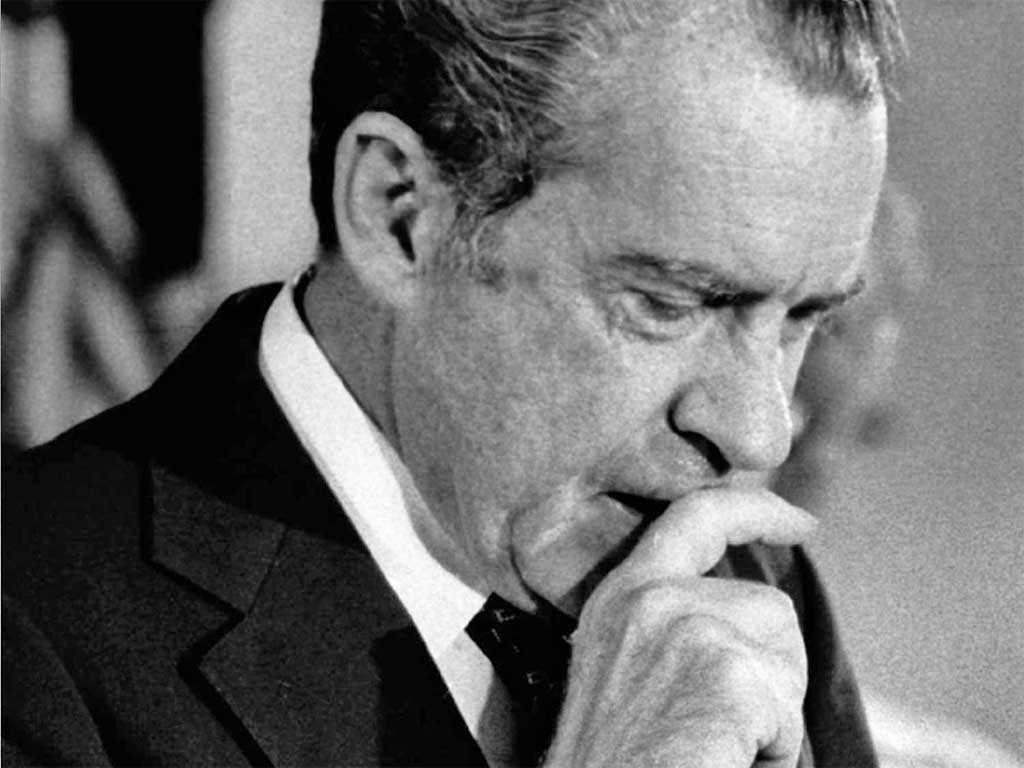Donald Trump is not the only US President to fire an Attorney General - but Nixon is the only other

Donald Trump fired Sally Yates after she refused to comply with his executive orders on immigration, making him only the second President in US history to dispense with his Attorney General. The other was Richard Nixon, eight months before he resigned before he was impeached.
Commentators have compared Mr Trump’s “Monday night massacre”, as cable networks began calling Ms Yates’ dismissal, to Nixon’s famous “Saturday night massacre” which he carried out during the Watergate crisis of 1973, sparking a chain reaction which ultimately led to Nixon’s downfall.
The Watergate Scandal, portrayed in the film All the President’s Men, centred around a break-in at the Democratic National Committee in Washington and the attempted cover-up by the Nixon administration of its involvement.
In November 1973, Nixon ordered then Attorney-General Eliot Richardson to fire special prosecutor Archibald Cox after he was assigned a significant role in the Watergate investigation and subpoenaed the President to hand over the tapes of conversations made in the Oval Office.
Mr Richardson refused point-blank to fire Mr Cox and resigned in protest. For good measure, his Deputy Attorney General William Rucklehaus, resigned after he too refused to give Mr Cox his marching orders. The Solicitor General, Robert Bork, then did Nixon’s bidding, and Mr Cox was duly fired.
Federal District Judge Gerhard Gessell ruled the dismissal of Cox was illegal because of the absence of any “extraordinary impropriety” which would have justified it.
Congress was infuriated by Nixon’s act, which they regarded as a gross abuse of presidential power, and the tide of public opinion seemed to turn against him, with a large number of telegrams flooding into the White House and Congress expressing disgust.
In the days that followed, opinion polls showed that for the first time, a majority of American citizens supported the impeachment of their President, and numerous resolutions of impeachment against the President were introduced in Congress.
As with Mr Trump’s dismissal of Ms Yates – and the highly controversial events surrounding it – the departure of Mr Richardson was front page news both in the US and internationally.
Nixon was compelled to allow the appointment of a new Special Prosecutor Leon Jaworski to continue the investigation. He may have hoped the replacement would limit himself to the investigation of the Watergate break-in alone – but he took Mr Cox’s lead, and looked at the broader activities surrounding it.
The storm around Watergate continued to gather over the following months, and in the face of mounting pressure and certain removal from office through the impeachment process, Nixon resigned on August 9, 1974 – the only President in US history to do so.
Eliot Richardson’s resignation – widely viewed as constructive dismissal – did him no harm. In 1974, he received the John Heinz Award for Greatest Public Service by an Elected or Appointed Official.
He later served as ambassador to the UK and received the Presidential Medal of Freedom – the nation’s highest civilian honour. Upon his death on New Year’s Eve, 1999, he was recognised as a “Watergate martyr” by major media outlets including CNN for refusing to do the President’s bidding.
Those opposed to Mr Trump have been quick to draw parallels between Mr Richardon and Ms Yates, who was appointed by Barack Obama and serving as the Acting Attorney General until Mr Trump has his own pick approved.
Outlining her reasons for refusing to support Mr Trump's sweeping immigration ban, Ms Yates said: “At present, I am not convinced that the defence of the executive order is consistent with these responsibilities of the Department of Justice, nor am I convinced that the executive order is lawful”.
In a White House statement, Yates was said to have “betrayed the Department of Justice by refusing to enforce a legal order designed to protect the citizens of the United States.”
Ms Yate’s actions are already being hailed as heroic, with Senate Minority leader Chuck Schumer calling them “a profile in courage”.
Democat congressman John Conyers was one of many to criticise her unceremonious dismissal, saying: “If dedicated government officials deem [Trump's] directives to be unlawful and unconstitutional, he will simply fire them as if Government is a reality show.”
But not everyone agrees the comparison between Mr Richardson and Ms Yates bears scrutiny.
Watergate journalist, Carl Bernstein, told CNN: “There’s a big difference, because the Saturday night massacre was really about firing the Attorney General when Nixon was the target of an investigation and was actively obstructing justice.
“I think the President is within his rights here to fire the Attorney General, that he has that ability," he said.

 Yahoo News
Yahoo News 
